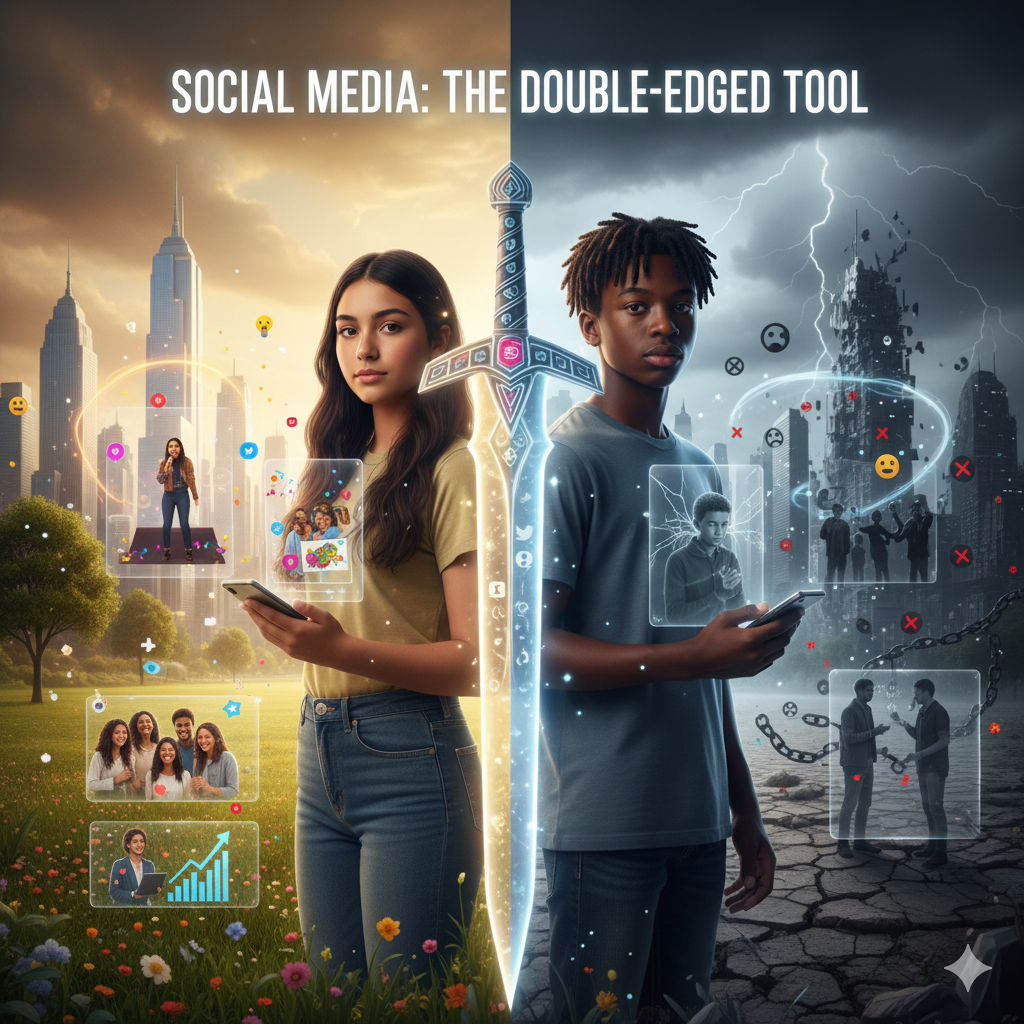
Rasandi Ranasinghe
What is Social Media? The book definition of social media is ‘The collection of online platforms and apps that allow people to create, share and exchange information and content.’
In fact, social media is entertainment, addiction, identity, connection, validation, destruction, inspiration all in one. With the rise of social media, the world was divided into three groups.
1: People including the founders of these platforms who claims that social media is the best thing that happened to Humans.
2: Who says “No! We disagree. Social Media is a deadly virus; it’s the devil in disguise.”
3: The one that have no opinions on these which includes toddlers, people who have no idea about social media and the people who have other bigger problems.
So, who’s right? Who wins this debate?
Nobody.
Because social media is another instance of Yin & Yang. It’s never fully good. Never fully bad. It just exists. And we’re the ones who weaponize it or elevate it.
What humans should do is to use it properly. But it’s not as simple as said, because people think they’re really smart but always fall into small vicious traps. we used to lay on grass, now we lay in bed with a phone 5cm from our face. Yes, with the improvements of technology we need to improve too. Emphasis on the word ‘improve’. Giving away your life and soul to social media is not how you improve.
People grow old with so many regrets. I assure you, if you keep using social media in a way that ruins you, you’ll blame it for your own mistakes.
Psychology says that humans love taking credit for achievements: “I worked so hard, look how smart I am!” while when they fail, they find otherworldly excuses to get away from it. “I couldn’t study because the weather was gloomy.” This is exactly what people do with social media too.
“My eyesight got ruined by TikTok”
“My family doesn’t talk anymore even when they’re in the same room because of phones…”
“My teenage daughter is dating an older man she met online…”
Blaming the app is easier than admitting you lost control. Social media is not poisonous. People poison it. Social media is us; we make it good or bad.
The older generations didn’t start their lives with social media unlike the younger generations. But everything changed during the Covid-19 pandemic where everybody had to rely on online resources for their work and education and to cope with stress and fear while being locked in your homes. And who affected the most are the teenagers and the kids.
“Globally, nearly all teenagers use social media, with studies indicating that over 90% of those aged 13-17 have used at least one platform. A significant portion are daily users, with some even describing their use as ‘almost constant’.”
Post covid has given the perfect excuse for a Teen to be on a device: Homework are sent on WhatsApp. Notes are on YouTube. Classes are held online.
While some balance studies and entertainment most sacrifice their education for temporary happiness. Let me tell you three real world examples.
She was confused about her sexuality. She wasn’t sure who she was or what she liked. She was vulnerable. Online ‘friends’ on social media started telling her who she is. She wasn’t discovering herself, she was being told who she was supposed to be. But gladly she was smart enough to escape. Now she knows who she is more than anyone.
2.Someone
A girl I know had the talent of singing and dancing. She didn’t have connections or money. Back in 2020 she started posting covers on TikTok and Instagram. She was smart and mindful of how it worked and had her family’s support as well. Today? she’s monetizing her music, got brand deals and performs publicly. Because social media can also be a door.
When I first got social media, as a 15-year-old, I compared myself to every girl my age.
Bodies.
Skin.
Success.
Looks.
Life.
My self-esteem crashed.
But one day, I switched how I used it. I followed creators who taught me skills, gave me new goals, made me think, inspired me. Social media didn’t change. I changed how I consumed it.
Teenagers are in an age where their whole identity is shifting, their thoughts, beliefs, self-image, everything. The first mistake adults make is failing to guide them through that stage, and the second is going to extremes: either being too strict that teens start hiding everything or being too lenient just to look like the “cool parent.” Be their friend but don’t let them forget that you’re still the parent.
A developing mind is easy to influence. Teens can become anxious, stressed, and experience intense FOMO from constant scrolling. In the pressure to keep up with trends, they forget about their studies and real-life responsibilities. Also, behind a screen, people feel fearless and unfiltered, and if a teen shares too much publicly, they can be cyberbullied, pushed into insecurities, or even targeted by dangerous individuals.
There’s a dark side of social media designed to push certain ideas onto young minds, which was nicely portrayed in the tv series Adolescence. I feel a responsibility now, as someone who has already crossed that stage, to protect those still inside it. Parents avoid uncomfortable topics with their kids and kids out of curiosity and fear go online to find answers. That’s how they fall into dangerous corners of the internet. Teach kids what’s appropriate for their age and remind them that social media is not a crime, but it also should never replace real life.
Social media can also inspire goals you never knew you needed. It can teach you what school never did, give you a stage to show your talent, and connect you with people who think like you.
Social media is a tool. It can destroy you or build your future.
and the difference lies on how you use it.